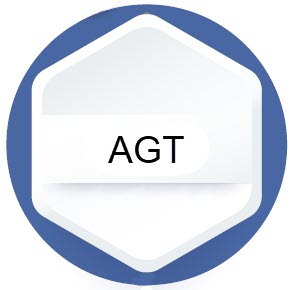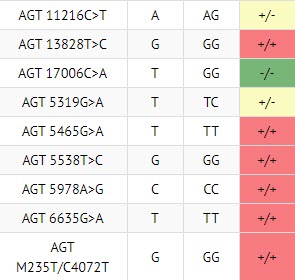AGT gene mutations

The AGT gene is also called “angiotensinogen”, this gene is responsible for keeping essential electrolytes in balance. AGT genes can cause imbalances in these electrolytes that can lead to serious health problems, even conditions such as:
- Essential hypertension
- Hypertension
- Preeclampsia
- Acute coronary artery syndrome
- Coronary artery disease
- Stroke
- Heart attack
- Type 2 diabetes
- Left ventricular hypertrophy
- Myocardial infarction
- Peptic ulcer hemorrhage
AGT genes are regulators of:
- Blood pressure
- Body fluid
- Electrolyte homeostasis
Symptoms of essential electrolytes imbalances
Sodium:
- Dizziness
- Heat exhaustion
- Low blood pressure
- Rapid pulse
- Mental apathy
- Loss of appetite
- Muscle cramps
- Nausea
- Vomiting
- Reduced body weight
- Headaches
Potassium:
- Rapid irregular heartbeat
- Muscle weakness
- Pins and needles
- Irritability
- Nausea
- Vomiting
- Diarrhea
- Swollen abdomen
- Cellulite
- Low blood pressure resulting from an imbalance of potassium: sodium ratio
- Confusion
- Mental apathy
Magnesium:
- Muscle tremors or spasms
- Muscle weakness
- Insomnia or nervousness
- High blood pressure
- Irregular heartbeat
- Constipation
- Fits or convulsions
- Hyperactivity
- Depression
- Confusion
- Lack of appetite
- Calcium deposits in soft tissue e.g. kidney stones
- Low levels of magnesium are also associated with increased rates of heart attack, anxiety, and nervousness
As you can see AGT gene mutations can cause many symptoms and also lead to many diseases. Here is what they may look link, homozygous (double bad copies in red), heterozygous (1 half a bad copy in yellow):


